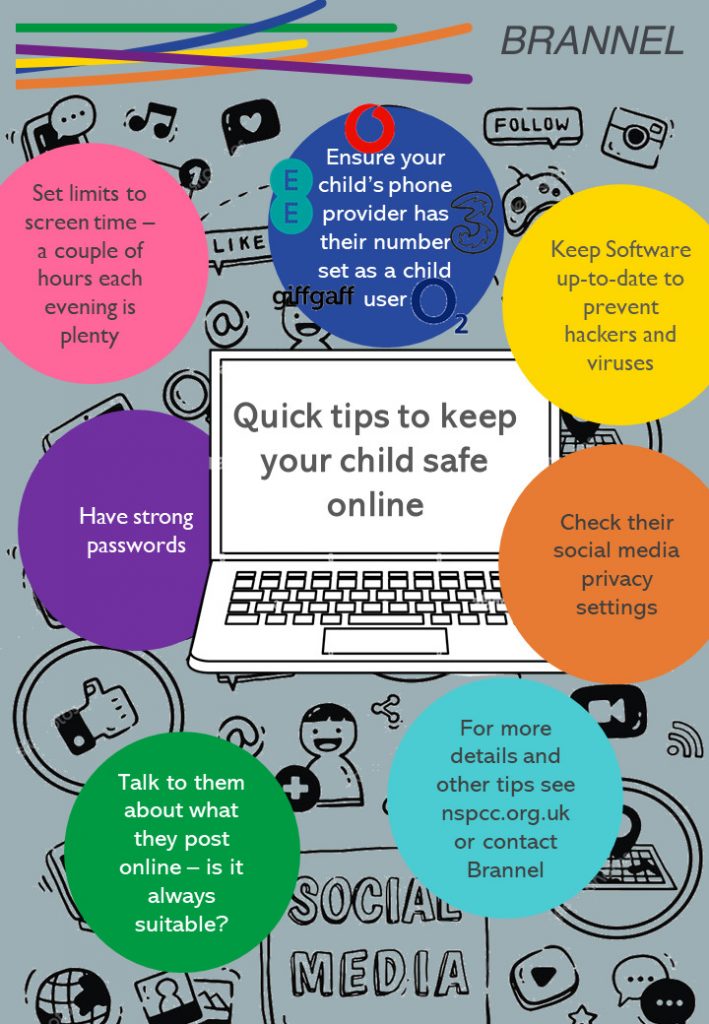Providing advice and protection
You may sometimes feel that your children have better technical skills than you do. However, children and young people still need your advice and protection when it comes to managing their lives online.
The good news is that you don’t need to be an expert on the internet to help keep your child stay safe online. There are plenty of resources to support you as you support your child to use the internet safely, responsibility and positively.
The most important thing is to get involved with your children and their lives online. By maintaining an open dialogue with your child and encouraging them to talk to you about their internet use, you can help them to access the resources the internet has to offer whilst keeping them safe online.
A Family Agreement is a great way to start a conversation with your whole family about how you all use the internet and discuss together how to behave in a positive way when online at home, at school or at a friends house. Childnet’s Family Agreement template provides a framework that will help families set clear expectations for positive and safe internet use.
Getting your head around online safety tools
Most online services offer some safety features that can help you manage access to age-inappropriate content, report concerns or protect privacy. It is a good idea to think about the sites and services your family uses, and check out which features these sites have that might be helpful for you.
If your child has seen inappropriate content
Sometimes, innocent searches can lead to not so innocent results. And sometimes, children may look for things because they are curious. It is important to know how to reassure young people and help them know what to do and where to go for support if they see inappropriate content online. If your child has seen inappropriate content online, you can:
- Talk with them about what they’ve seen – let them know what is, and isn’t, appropriate for their age.
- Reassure them they can come to you, another trusted adult or Childline if they’re worried about something.
- Get advice on setting up parental controls. Try the useful links below.
- Report any inappropriate, illegal, explicit, identifying or distressing content to CEOP through their website.
- Child sexual abuse content found online should also be reported to the Internet Watch Foundation.
- Block any distressing, inappropriate or upsetting content on social media websites. You can learn how to do this through Net Aware.

Useful links
Websites:
Internet Matters: https://www.internetmatters.org/
Childnet International: https://www.childnet.com/parents-and-carers/hot-topics/
NSPCC Online Safety Guide: https://www.nspcc.org.uk/keeping-children-safe/online-safety/
UK Safer Internet Centre: https://www.saferinternet.org.uk/advice-centre/parents-and-carers
Issues:
Smartphones, gaming devices, tablets and other internet-connected devices: https://www.saferinternet.org.uk/advice-centre/parents-and-carers/parents-guide-technology
Social media safety tools: https://www.saferinternet.org.uk/advice-centre/social-media-guides
Setting up parental controls: https://www.internetmatters.org/parental-controls/
Checklist – Set up kids’ tech devices with safety settings : https://www.internetmatters.org/resources/e-safety-checklist-getting-your-kids-tech-devices-set-up-safe/
Safety advice by age group: https://www.internetmatters.org/advice/
Sexting: https://www.nspcc.org.uk/keeping-children-safe/online-safety/sexting-sending-nudes/
Protecting your child from online porn: https://www.nspcc.org.uk/keeping-children-safe/online-safety/online-porn/
Livestreaming and video apps: https://www.nspcc.org.uk/keeping-children-safe/online-safety/livestreaming-online-video-apps/

